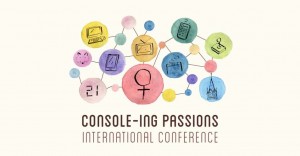Report From: Console-ing Passions at 21
 On the 21st anniversary of the Console-ing Passions International Conference, situated at De Montfort University in Leicester, UK on June 23-25, British TV scholarship proved to be the prevailing star of the event. That’s not to say, by any means, that these talks were superior to any other discussions, as a conference of this caliber continuously demonstrates the highest quality work in feminist media scholarship and media studies as a whole.
On the 21st anniversary of the Console-ing Passions International Conference, situated at De Montfort University in Leicester, UK on June 23-25, British TV scholarship proved to be the prevailing star of the event. That’s not to say, by any means, that these talks were superior to any other discussions, as a conference of this caliber continuously demonstrates the highest quality work in feminist media scholarship and media studies as a whole.
Given the spatial limitations of this report, and as an American student of European origins who began her graduate education in the UK, I hope that my transnational background can assist in evaluating the benefits of this year’s Console-ing in England. With American media often at the foreground, learning of some of the most noteworthy British broadcasting is vital.
During Charlotte Brunsdon’s plenary talk, “The Television City,” the celebrated scholar first compared the representations of the cinematic city with its sister medium once considered inferior. She then focused on London in particular as both the local site in series such as EastEnders as well as a global presence on BBC News, in contrast to more generic outlets such as CNN and Al Jazeera. She  expanded on the use of London first as a multi-cultural, near-utopian trope in the 1980s sitcom set in the Peckham-Rye neighbourhoud, Desmond’s. Another major example she cited is the Victorian feel of London in crime series such as BBC One’s recently remade Sherlock, despite its actual filming in Cardiff. She recalled the establishing klick-klack sound of heels on cobblestone roads amidst a foggy backdrop that usually indicates the unfortunate demise, usually murder, of a beautiful woman, often a troubled prostitute.
expanded on the use of London first as a multi-cultural, near-utopian trope in the 1980s sitcom set in the Peckham-Rye neighbourhoud, Desmond’s. Another major example she cited is the Victorian feel of London in crime series such as BBC One’s recently remade Sherlock, despite its actual filming in Cardiff. She recalled the establishing klick-klack sound of heels on cobblestone roads amidst a foggy backdrop that usually indicates the unfortunate demise, usually murder, of a beautiful woman, often a troubled prostitute.
This understanding of London as a social, political, cultural, and economic hub of the specific and local as well as the vast and global contributes to the overall impetus of British academia to analyze media in both the micro and macro sense.
This notion especially resonated following the foundational panel on Fandom, one of the most burgeoning areas of media studies today, when Teresa Forde thoughtfully queried Suzanne Scott on the Americannes of her presentation on “Fake Geek Girls.” For any US scholar present, or any follower from afar who read Charlotte Howell’s corresponding tweet, “One of the best parts of attending #cp2013 in the UK is that American scholars (like myself) are forced to interrogate our implicit Americanness,” a collective light bulb loomed over our heads on the need to further discuss our work in the interest of national identity in a global intellectual landscape.
Topics on British women figures were some of the most memorable that cultivated knowledge on national consciousness. Hannah Hamad spoke of how “The Austere Celebrity of Mary Portas” is yet another indicator of recessionary nationalism in the vein of recent pageantry such as the Royal Wedding, Queen’s Jubilee, and the 2012 London Olympics. Faye Woods explained how Clare Balding, “a slightly posh lesbian, nearing middle age, with a sensible haircut,” became a British national treasure during her Olympics coverage for the BBC and Paralympics for Channel 4.
Coming from a similar background as Balding, comedian and showrunner of sorts Miranda Hart was the subject of two out of the three presentations during the Comedy and Femininity panel. Chris Becker’s American perspective on Miranda’s use of traditional sitcom conventions argued for its value alongside the cultural primacy of acknowledged single-cam quality shows, using Elana Levine and Michael Newman’s Legitimating TV as the reference for cultural legitimation of Hart’s work. Rosie White expanded on Hart’s place in both the zeitgeist of British TV and women’s performativity. Forde’s talk positioned Julia Davis’ work as transgressive TV in Nighty Night, Hunderby, and Lizzie and Sarah, noting the auteur-like qualities of the actress, writer, director, and producer’s distinctively dark comedic proclivities.
The History of Television for Women in Britain: Highlights, Insights, and Future Agendas panel detailed the De Montfort and Warwick University partnership on the UK Arts and Humanities Research Council-funded project that uses both archival and audience response methods to examine what TV meant for British women during the 1940s to 1980s. Helen Wood and Helen Wheatley’s presentations conveyed their goal to produce the British equivalent of the historical work of Lynn Spigel on the relationship between women and American television, and Hazel Collie and Mary Irwin’s collaboration showed the merits of the new methodologies in archival work along with in- depth interviews of TV audiences of the time to understand what the medium meant to women of the era.
Beyond the UK, Console-ing Passions at 21 brought forth some of the best scholarship on the intersection of gender and sexuality, with new views on both femininity and masculinity— from talks on The League to pro wrestling to Bronies—alongside race, ethnicity, national identity, class, as shown on fictional, reality, and news TV, social media, the internet, video games, and so much more, all packed into three days of 30+ panels.
Additionally, I greatly valued international perspectives such as Ireland through the lens of a dubious investigative series from my co-panelist Madeleine Lyes, Indian surrogacy as discussed by Sujata Moorti, and subdued Latin identity in tween programming as highlighted by Mary Beltrán.
As a first time Console-ing presenter, being a part of such an international conference, that further confirmed the rich breadth of valuable work being done in the expansive feminist media studies community across the globe, will remain one of the most invaluable experiences of my academic career.

This post is part of an ongoing partnership between the University of Wisconsin-Madison’sAntenna: Responses to Media & Culture and the Society for Cinema & Media Studies’ Cinema Journal.



